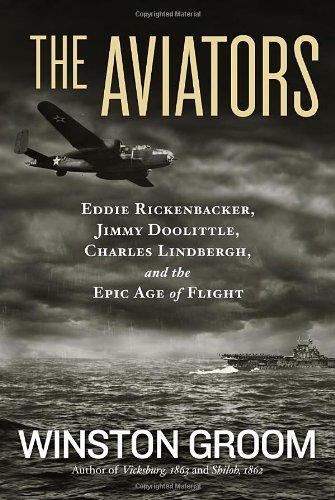Have you ever read a book and, upon turning the last page, were sorry that it had ended?
The Aviators is such a work.

I happened upon it accidentally, a consequence of margaritas, enchiladas and three hours catching up with a dear friend. The walk back to Union Station, the West Line and home, passed Tattered Cover. A few minutes to clear the head and.... What could it hurt.
Aviation as a
subject matter has appealed to me since my father took me to the Johnsville Naval Air Station for my first air show in 1959. My first novel begins at the EAA Fly In at Oshkosh. The cover naturally caught my eye, and I plucked it from the shelf.
Winston Groom is a writer of repute -
Forrest Gump among many
. A few moments of scanning and I had to have it.
Groom describes the lives of three American giants in the early moments of aviation. Eddie Rickenbacker, the "Ace of Aces" flying during WWI. Charles Lindbergh, "Slim" - New York to Paris in 1927. Jimmy Doolittle, diminutive command pilot who planned and led America's first response to Pearl Harbor. He writes in a direct and accessible manner.
Lindbergh had been a non-interventionist prior to World War Two. He had believed the European War would prove a disaster for civilization as a whole, no matter who was victorious. Upon America's entry, however, he set these views aside (never totally disavowing them) to assist with improvements to fighter aircraft in combat over the Pacific. Lindbergh served as a civilian, nevertheless flying fifty combat missions, shooting down an enemy plane and often leading formations. "Lindbergh was no longer a visitor," Groom quotes a squadron commander, commenting after a mission. "He was a fighter pilot and he talked like one. He wasn't the novice we thought him to be."
The personal insights into the men were both revealing and deftly told. Rickenbacker had been a race car driver who helped facilitate the growth of commercial aviation in America. Doolittle's engineering background (married to exceptional flying talent) led to the development of "blind flying," the use of instruments when nothing is visible from the cockpit. He was the first person to take off, fly a pattern and land without any outside references. And then this - hard drinking, hard living Eddie was asked, during a taped interview for his autobiography, if he'd ever had an extramarital affair. "I never had the time!" Groom reports, was the undisputed answer.
The Aviators may not have a place among the great literature of flying. Nevertheless, Groom has revealed details of these three men that, in one volume, lead to a greater understanding of how aviation evolved from wood and fabric to aluminum and little bags of pretzels.
 Scanning the digital world, cup of coffee in hand. Loyal Portie at my side and music streaming down on Rhapsody. Glancing over e-mails, I visit a discussion on PoliceOne.com about fitness testing for cops. One of the writers is getting a little worked up - lots of words in ALL CAPS. His opponent asks him to stop shouting. I don't know that the writer is aware of the convention. "Anyway, oldtimers over fifty...."
Scanning the digital world, cup of coffee in hand. Loyal Portie at my side and music streaming down on Rhapsody. Glancing over e-mails, I visit a discussion on PoliceOne.com about fitness testing for cops. One of the writers is getting a little worked up - lots of words in ALL CAPS. His opponent asks him to stop shouting. I don't know that the writer is aware of the convention. "Anyway, oldtimers over fifty...."






